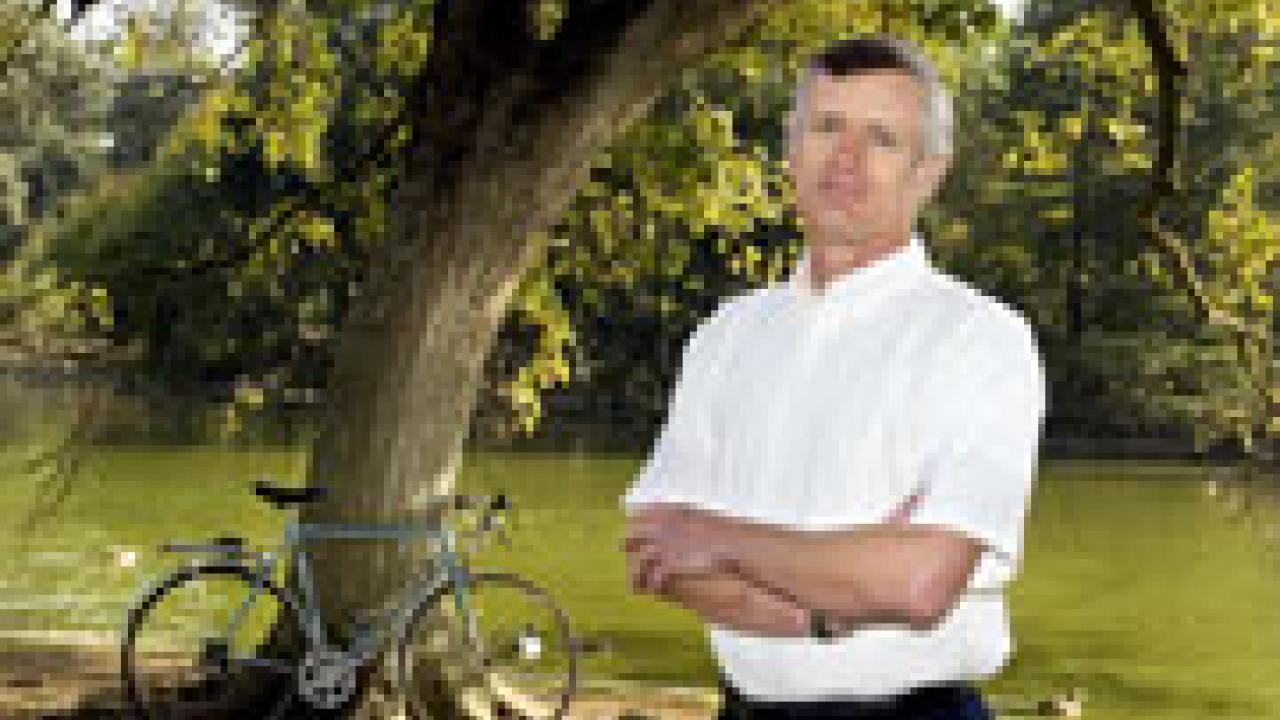Bruce Hartsough considers himself to be more a "chugger" than a "spinner." He is a good chugger, too, winning the Davis Double Century 200-mile bike race twice. Both wins, one solo and one on a tandem bike with his brother, proved that the chugger's more methodical pedaling style can beat the more rapid, spinning form characteristic of Tour de France racers.
Hartsough, a professor in the Department of Biological and Agricultural Engineering and former chair of the department, has loved cycling since he was an undergraduate at UC Davis.
"I happened to be (living) in Tercero," Hartsough said of his freshman year, "next door to a building that had several people in a bicycling club called the Cal Aggie Wheelmen, and I latched on to that group."
In fact, it was bike-friendly atmosphere of Davis that lured Hartsough back here after he received his doctorate in agricultural engineering in 1986. After commuting 20 miles every day, Hartsough was pleased to once again live where biking was not only accepted, but encouraged.
"I just didn't like driving in by car," he said. "From now on, I'm going to be close enough so I don't have to use a car."
His journey from undergraduate to full professor status at UC Davis is an example of "serendipity," said Hartsough. After working in the forestry industry for several years, Hartsough found a staff position as a development engineer at UC Davis. Soon after arriving, his supervisor encouraged him to consider a position as a professor. Hartsough agreed, and went on to earn that doctoral degree from Auburn. Afterward, he returned to Davis, this time as a faculty member.
Now, having worked in Davis for more then 20 years, Hartsough is thankful for that initial nudge into his current profession. "If it hadn't been for that encouragement, I would have never considered joining the faculty," Hartsough said
Outside of teaching, biking and running the occasional marathon in New Zealand — "it was by far the most painful experience" — Hartsough loves to spend time outdoors refereeing soccer games.
"I didn't expect to like refereeing," he said. "I'm not a very good referee, I'll admit. But people who can't do, can teach. So now I'm instructing referees."
How did you get your start in forestry engineering?
My dad spent lots of time with us as kids working on things like building model airplanes, working with little engines and slot cars. That got me interested in engineering. I'm sure it was also genetic given that my dad was an engineer. We also did a lot of camping when we were kids, so that's the combination.
What were your first impressions of Davis when you were an undergrad?
I really didn't like it that well. I had not been outside of Marin County very much. My family did not travel a lot. Coming here I saw it was flat. And it was cold during the winter because in Marin it is mild. But after a while what really pulled me in was being able to bicycle.
What's your favorite spot on campus?
The redwood grove along Putah Creek. I do not go there very often, but just knowing that it's there is a big aspect. It is the combination of it being such a pleasant place on campus and the trees, especially with my interest in forestry.
What's your most treasured possession?
My family by far. No argument with that. My wife is also a UC Davis graduate — we met here in a biology class. I have three daughters; one of them is also an engineer. She is married and living in Sacramento. The second one is at Columbia University, getting a master's degree in public health. The third is a junior at UC Davis, though she is on an education abroad program in New Zealand for this quarter.
If you were granted three wishes, what would they be?
I would like to come up with an efficient, ecologically sound way of thinning forests to reduce fire danger. That's what a lot of my research has been on over the past several years. Fire danger is a big problem and there are not that many resources around for trying to remedy it. I would be very happy with my career if I could come up with a viable solution to reducing fire danger.
The second one would do with some more efficient way of capturing sunlight and using it for energy instead of fossil fuel. If I had a wish, it would be that we could solve that problem — that would be good.
Finally, when the Soviet Union disintegrated I was thinking, "Wow, we don't have to worry about conflicts anymore," and obviously that hasn't been the case. I think that if people could see potential for improvement in the future, then a lot of things that are going on now, just wouldn't continue. If we could give basic support for the kids, and have universal education so people could sense there was some way to improve their status in life, I think that would improve things around the world in the long term.
Allison Leung is a student intern at Dateline.
Media Resources
Clifton B. Parker, Dateline, (530) 752-1932, cparker@ucdavis.edu
